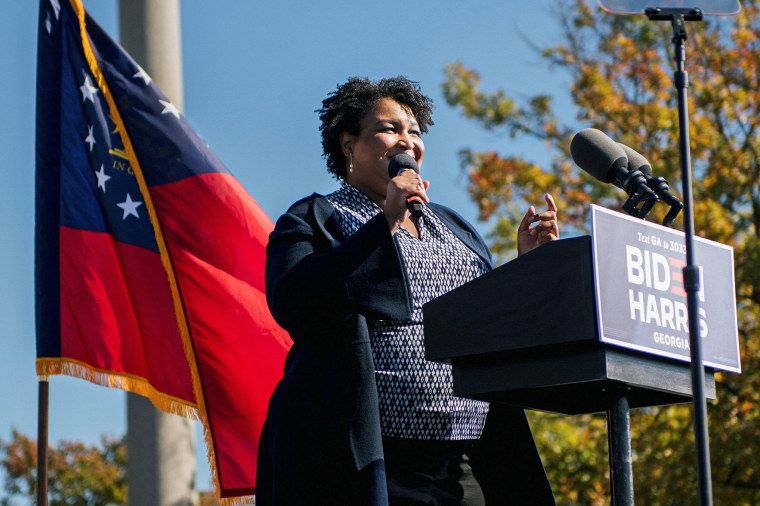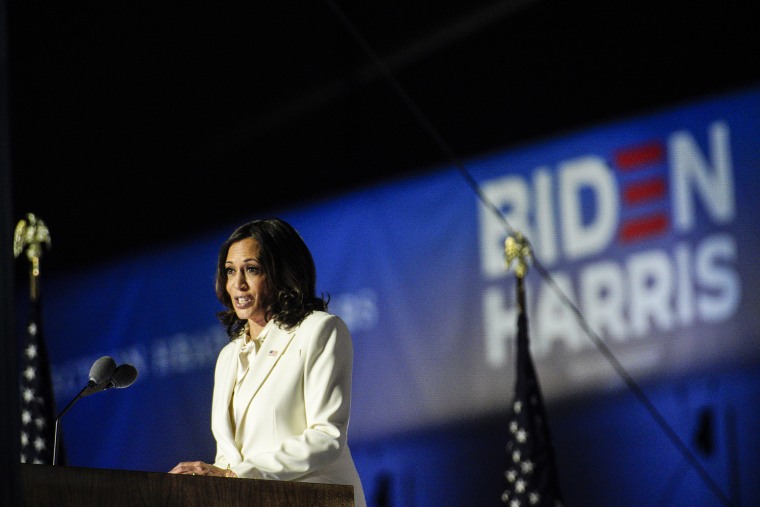Vice President-elect Kamala Harris went to Howard University. Stacey Abrams is a graduate of Spelman College. Raphael Warnock attended nearby Morehouse College.
These three politicians and a handful of others who grew in prominence during this election cycle hold degrees from historically Black colleges or universities, or HBCUs, which has prompted loud cheers among alumni and students.
HBCU representation in politics is not new, but after a contentious electoral season during a year when racial justice was front and center, students and graduates say it's heartening to see other alumni reach some of the highest echelons of political office.
"Our degrees are powerful," said Elandra Gilmore, a middle school social studies teacher and University of Arkansas at Pine Bluff alumna. She said "petty" arguments often pit HBCUs against predominantly white institutions, especially because positions of power often go to people who graduated from Ivy League schools or their peer institutions.
The arguments generally result in the presumption that "our degrees don't hold any weight," said Gilmore, who said seeing fellow HBCU alumni in their positions is refreshing to confirm that any degree is powerful no matter where you go.
"In a word, it's validation," said Mason Smith, a senior at Alabama State University. "To see these Black men and women succeed on one of the most difficult stages of the United States shows HBCUs can and will prepare you for any career."
Harris, Abrams and Warnock, as well as Atlanta Mayor Keisha Lance Bottoms and Missouri's first Black congresswoman, Cori Bush, have said they owe their success, in part, to HBCUs' jump-starting their careers.
"Howard University is one of the most important aspects of my life," Harris said over Martin Luther King Day weekend in January 2019 shortly after she announced her bid for the Democratic nomination for president. "It is where I ran for my first elected office. So this is where it all began."
Abrams, who narrowly lost her campaign for governor of Georgia in 2018, invoked the power of her alma mater, Spelman College in Atlanta, as she accepted the school's Local Community Service Award last year. "I may not occupy the governor's office, but we have made our imprint," she said. "With our election – and I say it's our election because Spelman, you were with me every single day — with our election, we changed the narrative of what it means to be a leader in America. ... I didn't have to change my hair, my gender or my skin color" to run for political office.
Abrams did not run for office during this election cycle, but many credit the Democratic Party's slight lead in Georgia, so far, to her organization Fair Fight, which registered 800,000 first-time voters over the past two years.
"We have leaders who now have to look over their shoulders every day, because we're coming," Abrams said in the same speech.
Bottoms, a mainstay on the campaign trail for Joe Biden who was reported to have been on his running mate shortlist, graduated from Florida A&M University; Bush, who will be the first Black woman to represent Missouri in Congress, went to Harris-Stowe State University in St. Louis; Warnock is in a runoff for a Senate seat from Georgia.
Justus Hawkins, a senior at Morgan State University in Baltimore, points to figures like Harris, Bottoms and Warnock to reject claims that HBCUs "don't prepare you for the 'real world'" and debates about whether graduates "will be qualified enough or have a skill set."
"Look at everyone who just won," Hawkins said. "Look at everyone who continues to win. They're products of HBCUs."
Jainaba Seckan, a Spelman graduate who is a project manager in the Office for Diversity, Inclusion and Belonging at Harvard University, tweeted, "Proud of the talented HBCU grads who have played critical roles in this election or are competing in major races."
Charles Walton III, a Howard University graduate who is the founder and CEO of Living Legends Group, a sports, entertainment, production and brand management company, tweeted: "HOWARD UNIVERSITY STAND UP! We in the White House."
Rick Hart, a junior at Morehouse College, said, "It's encouraging to see people who look like you, who've attended similar institutions as you, who have the same experiences as you, rise to the highest levels of the political sphere."
In addition to the HBCU graduates' sheer presence in politics, their voter drives also encouraged others to elevate their civic engagement.
Most recently, Hart was a fellow on the Biden-Harris campaign. Before that, he interned in the Baltimore mayor's office and on Abrams' campaign for governor.

"People like Rev. Warnock is why I wanted to get involved in politics," Hart said. "It's super powerful to see people who look like me fighting for a seat at the table while showing me that I can, too."
Harris, Abrams, Bottoms, Bush and Warnock add to a long history of HBCUs' impact across generations.
Noliwe Rooks, the W.E.B. Du Bois professor of literature in the department of Africana studies at Cornell University, said in a statement that HBCUs in contemporary and historical politics speak "to a very different conception of and path to access and influence."
"One of the extraordinary facts about the incoming administration is that neither the President-elect or Vice President-elect attended an Ivy League institution […] in a nation that valorizes and rewards those graduates," Rooks said. "These realities should put to rest questions about how and if such schools are relevant to American politics in the 21st century."
There are over 100 HBCUs, which were established primarily to educate Black students when local, state and federal laws barred them from attending predominantly white institutions.
As a result, HBCUs are widely credited with providing top-tier educations while preparing students for the discrimination they may face post-graduation.
HBCU representation in contemporary politics confirms that legacy, as do notable alumni throughout history. Thurgood Marshall, the Rev. Jesse Jackson, Martin Luther King Jr., Alice Walker and Rep. John Lewis all graduated from HBCUs.
"This election showed us exactly how crucial the African-American agenda is to the landscape of politics," FAMU senior Titilayo Okuwa said in a statement. "HBCU's produce the largest number of black professionals. It is clear that alumni will continue to run for and excel in political offices."


